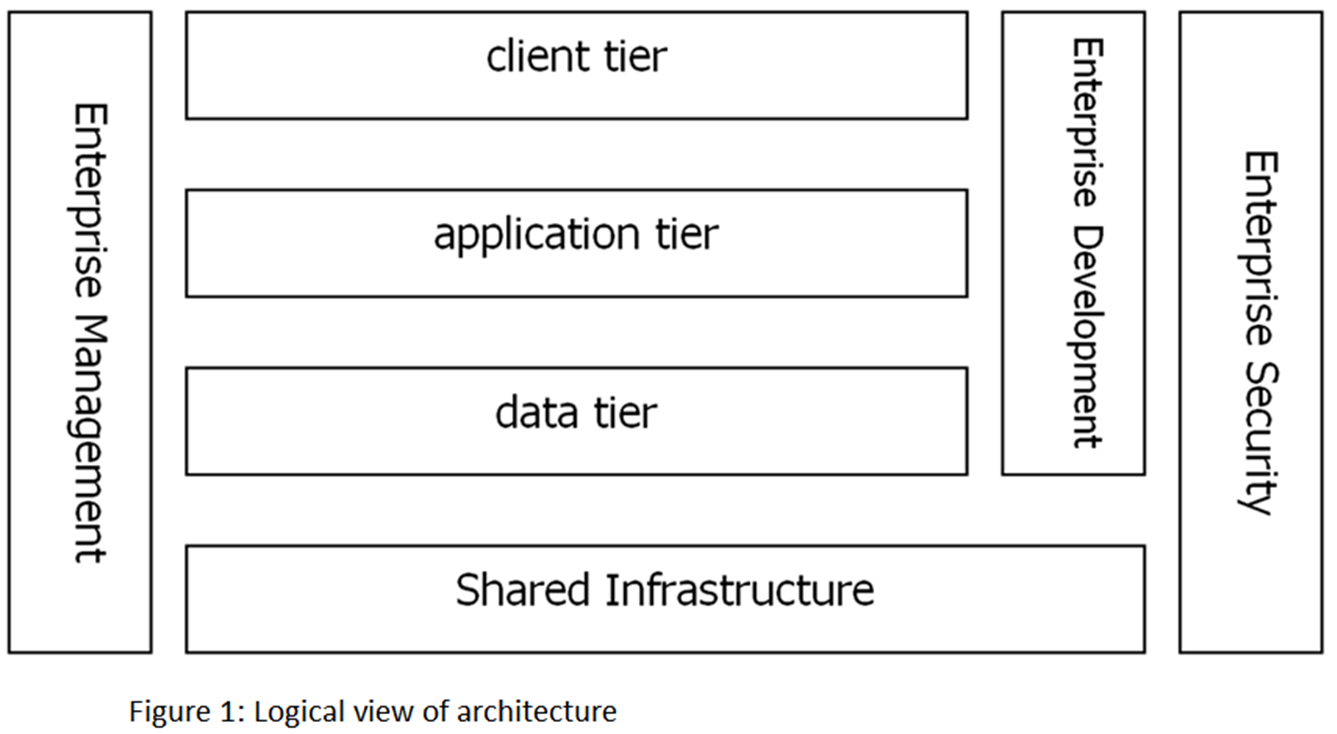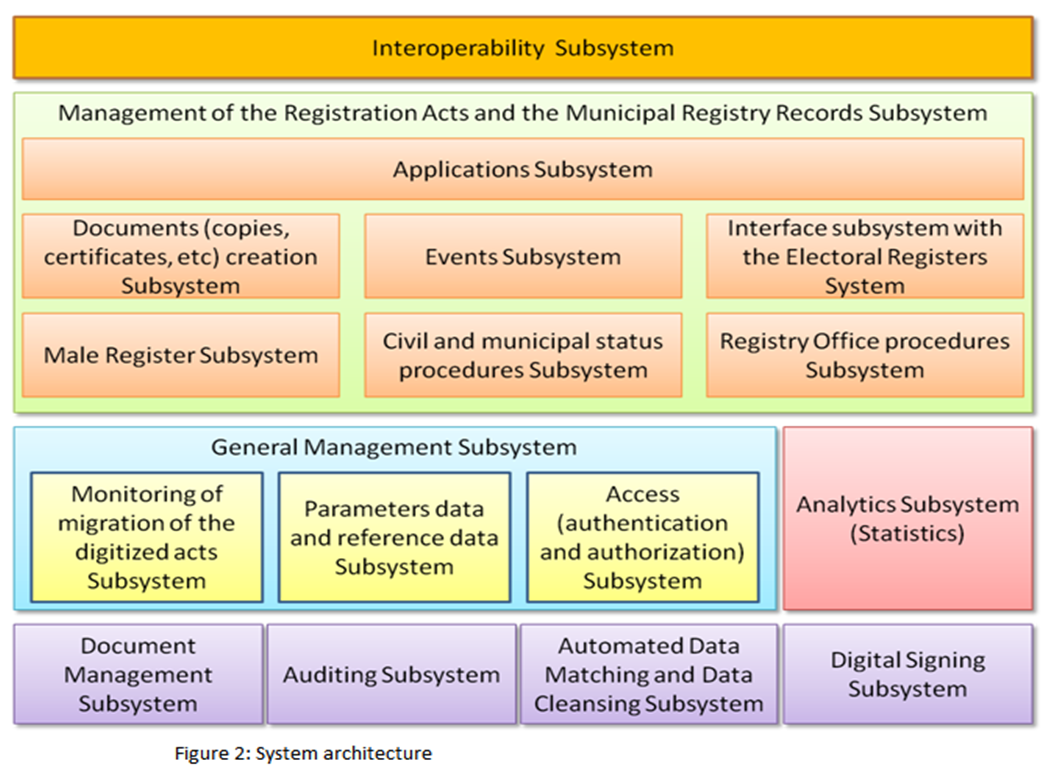General Information
Cases/Enablers
OOP Case
Appetizer
The Hellenic Citizens’ Registry is the base registry of citizens’ civil and municipal status information. This information system transforms administrative procedures and will allow citizens to only provide their data once.
OOP aspect
Any governmental information system that needs civil and municipal status data can now acquire them in an automated way from the Citizens’ Registry.
Short summary
The Hellenic Citizens’ Registry is the base registry (authentic source) hosting citizens’ civil and municipal status information. It includes the development of a central infrastructure (hardware and software), owned by the Ministry of Interior, and thus the establishment of a base Information System (Citizens’ Registry) implementing the following functionality:
I. Through a single web-based application, authorized users of the Ministry of Interior and local government organisations, have rights to register, search, update/edit, monitor and print any kind of civil and municipal status information. In the first place, all relevant citizens’ (life) events are registered, once only, by the competent local offices across all the municipalities of the country (1034 distributed offices),
II. Certified public-sector organisations (units/bodies of interoperability) have automated access to the database of the Citizens’ Registry.
All databases, where currently civil and municipal status data are stored, have been consolidated (aggregated, migrated) into the new database of the Citizens’ Registry. Moreover, a lot of work has been done for ensuring data quality (data matching and data cleansing).
I. Through a single web-based application, authorized users of the Ministry of Interior and local government organisations, have rights to register, search, update/edit, monitor and print any kind of civil and municipal status information. In the first place, all relevant citizens’ (life) events are registered, once only, by the competent local offices across all the municipalities of the country (1034 distributed offices),
II. Certified public-sector organisations (units/bodies of interoperability) have automated access to the database of the Citizens’ Registry.
All databases, where currently civil and municipal status data are stored, have been consolidated (aggregated, migrated) into the new database of the Citizens’ Registry. Moreover, a lot of work has been done for ensuring data quality (data matching and data cleansing).
URL
Focus
Citizens
Start date
Domain
Public matter
Scope
National/Federal
Country
Greece
Nature and status of project
Rolled Out
Is the OOP case/enabler mandatory?
Mandatory
Additional remarks
Benefits:
• In the framework of the project all databases, where currently civil and municipal status data are stored, will be consolidated (aggregated, migrated) into a new database of the (National) Citizens’ Registry.
• Increase the quality of data: a lot of work will be done for the ensuring of data quality like data matching and data cleaning
• Promotion of OOP: After the implementation of the project, any Governmental Information System that needs civil and municipal status data will have the ability to acquire them in an automated way from the (National) Citizens’ Registry
• Citizens do not need to submit repeatedly personal basic data to the different authorities
• In the framework of the project all databases, where currently civil and municipal status data are stored, will be consolidated (aggregated, migrated) into a new database of the (National) Citizens’ Registry.
• Increase the quality of data: a lot of work will be done for the ensuring of data quality like data matching and data cleaning
• Promotion of OOP: After the implementation of the project, any Governmental Information System that needs civil and municipal status data will have the ability to acquire them in an automated way from the (National) Citizens’ Registry
• Citizens do not need to submit repeatedly personal basic data to the different authorities
ENABLING ASSETS OR COMPONENTS
Legal interoperability
eGov Law (FEK 3979A/16 JUNE 2011) (The President of Hellenic Republic and other ministries), http://www.et.gr/idocs-nph/search/pdfViewerForm.html?args=5C7QrtC22wFYAFdDx4L2G3dtvSoClrL8aRmGcrk2DyZ5MXD0LzQTLWPU9yLzB8V68knBzLCmTXKaO6fpVZ6Lx3UnKl3nP8NxdnJ5r9cmWyJWelDvWS_18kAEhATUkJb0x1LIdQ163nV9K--td6SIuWul0aw7wuQu_zIv4zGsWeDDAhtceLHtRKuKtY2AHivR
In the first paragraph of the nineteenth article of the aforementioned law it is
described the sharing of ICT infrastructure and data, excluding personal data.
------------
Law 344/1976 (About civil records), http://www.et.gr/idocs-nph/search/pdfViewerForm.html?args=5C7QrtC22wEE8HdDZpIXTHdtvSoClrL86BYA0d1yFht5MXD0LzQTLWPU9yLzB8V68knBzLCmTXKaO6fpVZ6Lx3UnKl3nP8NxdnJ5r9cmWyJWelDvWS_18kAEhATUkJb0x1LIdQ163nV9K--td6SIuQyLFOa5ZjWjf_VkyYhK4df9cch7GjEGBFTjCAr814Hs
Legal/regulatory framework of the operation of Registry offices of the municipalities.
------------
Law 4144/2013, http://www.et.gr/idocs-nph/search/pdfViewerForm.html?args=5C7QrtC22wEaosRGzKxO6XdtvSoClrL8Q92htLCbm4vtIl9LGdkF53UIxsx942CdyqxSQYNuqAGCF0IfB9HI6qSYtMQEkEHLwnFqmgJSA5WIsluV-nRwO1oKqSe4BlOTSpEWYhszF8P8UqWb_zFijLHQ4sMNb9S5-KgVspvCBT09JcBJUrwzbMZY-jJB_Wao
Legal/regulatory framework of the operation of Registry offices of the municipalities.
------------
Law 3274/2004, http://www.et.gr/idocs-nph/search/pdfViewerForm.html?args=5C7QrtC22wGQ_kZuUB4NxXdtvSoClrL8vnZOzRHI6VJ5MXD0LzQTLWPU9yLzB8V68knBzLCmTXKaO6fpVZ6Lx3UnKl3nP8NxdnJ5r9cmWyJWelDvWS_18kAEhATUkJb0x1LIdQ163nV9K--td6SIuZ-1cpOTdZmlvgRn-QK1oWwwzPqI2pXjfjZMG6vY6bXZ
Legal/regulatory framework of the operation of population register offices of the municipalities.
------------
Law 3463/2006, http://www.et.gr/idocs-nph/search/pdfViewerForm.html?args=5C7QrtC22wFGQ40gSLPFOXdtvSoClrL8jiNRVGgNfKB5MXD0LzQTLWPU9yLzB8V68knBzLCmTXKaO6fpVZ6Lx3UnKl3nP8NxdnJ5r9cmWyJWelDvWS_18kAEhATUkJb0x1LIdQ163nV9K--td6SIuVHS7RkLmkOPHW20UoL_dolR4J1CBn6vRurYLmlFUFZB
Legal/regulatory framework of the operation of population register offices of the municipalities.
------------
Law 2119/1993, http://www.et.gr/idocs-nph/search/pdfViewerForm.html?args=5C7QrtC22wGldAs1HD7Xe3dtvSoClrL8g-i4vJQsN8HtIl9LGdkF53UIxsx942CdyqxSQYNuqAGCF0IfB9HI6qSYtMQEkEHLwnFqmgJSA5WIsluV-nRwO1oKqSe4BlOTSpEWYhszF8P8UqWb_zFijAXw6_x7Fw9gsOo00_xtTp54M_NU5jlgCSRAqw6x1xLD
Legal/regulatory framework of the operation of male population offices of the
municipalities.
------------
Presidential Decree 26/2012, http://www.et.gr/idocs-nph/search/pdfViewerForm.html?args=5C7QrtC22wEbA_BZxkczbHdtvSoClrL8KoqaERu8wDDtIl9LGdkF53UIxsx942CdyqxSQYNuqAGCF0IfB9HI6qSYtMQEkEHLwnFqmgJSA5WIsluV-nRwO1oKqSe4BlOTSpEWYhszF8P8UqWb_zFijLJ-Z1LfWwIfmrp6wL4fCDFLsfxB5Yc731M_KmiHqgmV
It is the codification in a single text of the legislation for the election of the
members of the parliament.
In the first paragraph of the nineteenth article of the aforementioned law it is
described the sharing of ICT infrastructure and data, excluding personal data.
------------
Law 344/1976 (About civil records), http://www.et.gr/idocs-nph/search/pdfViewerForm.html?args=5C7QrtC22wEE8HdDZpIXTHdtvSoClrL86BYA0d1yFht5MXD0LzQTLWPU9yLzB8V68knBzLCmTXKaO6fpVZ6Lx3UnKl3nP8NxdnJ5r9cmWyJWelDvWS_18kAEhATUkJb0x1LIdQ163nV9K--td6SIuQyLFOa5ZjWjf_VkyYhK4df9cch7GjEGBFTjCAr814Hs
Legal/regulatory framework of the operation of Registry offices of the municipalities.
------------
Law 4144/2013, http://www.et.gr/idocs-nph/search/pdfViewerForm.html?args=5C7QrtC22wEaosRGzKxO6XdtvSoClrL8Q92htLCbm4vtIl9LGdkF53UIxsx942CdyqxSQYNuqAGCF0IfB9HI6qSYtMQEkEHLwnFqmgJSA5WIsluV-nRwO1oKqSe4BlOTSpEWYhszF8P8UqWb_zFijLHQ4sMNb9S5-KgVspvCBT09JcBJUrwzbMZY-jJB_Wao
Legal/regulatory framework of the operation of Registry offices of the municipalities.
------------
Law 3274/2004, http://www.et.gr/idocs-nph/search/pdfViewerForm.html?args=5C7QrtC22wGQ_kZuUB4NxXdtvSoClrL8vnZOzRHI6VJ5MXD0LzQTLWPU9yLzB8V68knBzLCmTXKaO6fpVZ6Lx3UnKl3nP8NxdnJ5r9cmWyJWelDvWS_18kAEhATUkJb0x1LIdQ163nV9K--td6SIuZ-1cpOTdZmlvgRn-QK1oWwwzPqI2pXjfjZMG6vY6bXZ
Legal/regulatory framework of the operation of population register offices of the municipalities.
------------
Law 3463/2006, http://www.et.gr/idocs-nph/search/pdfViewerForm.html?args=5C7QrtC22wFGQ40gSLPFOXdtvSoClrL8jiNRVGgNfKB5MXD0LzQTLWPU9yLzB8V68knBzLCmTXKaO6fpVZ6Lx3UnKl3nP8NxdnJ5r9cmWyJWelDvWS_18kAEhATUkJb0x1LIdQ163nV9K--td6SIuVHS7RkLmkOPHW20UoL_dolR4J1CBn6vRurYLmlFUFZB
Legal/regulatory framework of the operation of population register offices of the municipalities.
------------
Law 2119/1993, http://www.et.gr/idocs-nph/search/pdfViewerForm.html?args=5C7QrtC22wGldAs1HD7Xe3dtvSoClrL8g-i4vJQsN8HtIl9LGdkF53UIxsx942CdyqxSQYNuqAGCF0IfB9HI6qSYtMQEkEHLwnFqmgJSA5WIsluV-nRwO1oKqSe4BlOTSpEWYhszF8P8UqWb_zFijAXw6_x7Fw9gsOo00_xtTp54M_NU5jlgCSRAqw6x1xLD
Legal/regulatory framework of the operation of male population offices of the
municipalities.
------------
Presidential Decree 26/2012, http://www.et.gr/idocs-nph/search/pdfViewerForm.html?args=5C7QrtC22wEbA_BZxkczbHdtvSoClrL8KoqaERu8wDDtIl9LGdkF53UIxsx942CdyqxSQYNuqAGCF0IfB9HI6qSYtMQEkEHLwnFqmgJSA5WIsluV-nRwO1oKqSe4BlOTSpEWYhszF8P8UqWb_zFijLJ-Z1LfWwIfmrp6wL4fCDFLsfxB5Yc731M_KmiHqgmV
It is the codification in a single text of the legislation for the election of the
members of the parliament.
DATA HANDLING / DATA EXCHANGE
Type of data sharing
Actual data
Confirmation of a status, group/class membership
Data handler
Stakeholder name
Municipalities
Stakeholder category
Government
Stakeholder Role
Data recorder
Stakeholder name
Ministry of Interior
Stakeholder category
Government
Stakeholder Role
Database owner
Stakeholder name
Public Administration Organisations
Stakeholder category
Government
Stakeholder Role
Data consumer
Architecture
The following schematic figures have been uploaded:
Figure 1: Logical view of architecture
The logical view is represented as a web n-tier platform including the following tiers (layers):
- Orizontal layers (tiers): a) client tier (presentation, user interaction), b) application tier, c) data tier
- Vertical layers: a) Enterprise Security, b) Enterprise Management, c) Enterprise Development
- Shared Infrastructure: hardware
Figure 2: System Architecture
The various subsystems are shown in a structured block diagram.
Figure 1: Logical view of architecture
The logical view is represented as a web n-tier platform including the following tiers (layers):
- Orizontal layers (tiers): a) client tier (presentation, user interaction), b) application tier, c) data tier
- Vertical layers: a) Enterprise Security, b) Enterprise Management, c) Enterprise Development
- Shared Infrastructure: hardware
Figure 2: System Architecture
The various subsystems are shown in a structured block diagram.
Image upload


Lessons learned
Enablers
• Organizational/Semantic Level: The on time completion of a complementary project concerning the implementation of a BPR (Business Process Reengineering) plan, including the reengineering of the corresponding procedures as well as the merging (consolidation) of the competent offices of the municipalities (registry offices, municipal register offices and male population registry offices).
• Legal/Regulatory Level: Following the aforementioned BPR plan, the on time revision of the current legal/regulatory framework of the operation of registry offices, the municipal registry offices and male population registry offices of the municipalities.
• Project management: The on time completion of the implementation of subprojects related to the digitization of existing civil records in the registry offices and the subproject regarding the provision of education and support services (on-site and by telephone) to the registry offices and the municipal register offices.
• Organizational/Semantic Level: The on time completion of a complementary project concerning the implementation of a BPR (Business Process Reengineering) plan, including the reengineering of the corresponding procedures as well as the merging (consolidation) of the competent offices of the municipalities (registry offices, municipal register offices and male population registry offices).
• Legal/Regulatory Level: Following the aforementioned BPR plan, the on time revision of the current legal/regulatory framework of the operation of registry offices, the municipal registry offices and male population registry offices of the municipalities.
• Project management: The on time completion of the implementation of subprojects related to the digitization of existing civil records in the registry offices and the subproject regarding the provision of education and support services (on-site and by telephone) to the registry offices and the municipal register offices.
